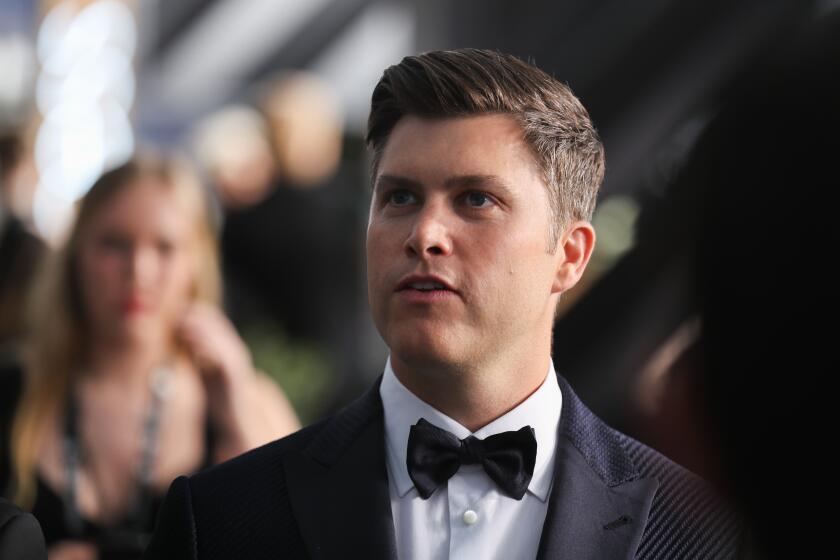Frank Mancuso Roars Into Action at MGM
The Frank G. Mancuso era at MGM began early on Monday when a driver came to transport him to the company’s headquarters in Santa Monica.
This was more than the usual sort of Hollywood indulgence, however. Mancuso had never been there and was afraid of getting lost.
The MGM office complex, which borders on an industrial neighborhood, is a far cry from the studio world Mancuso occupied as the former head of Paramount Pictures. His welcoming came when he was ushered into a vacant fifth-floor executive suite staffed by a temporary secretary. By early morning, Mancuso was on the hunt for his own fax machine, since the congratulations and job applications were clogging up the ones already in use.
His first meeting was with MGM production head Jay Kanter, a long and trusted associate of ousted studio chief Alan Ladd Jr., over MGM’s current and future projects.
Later, after greeting other staffers, Mancuso dashed off to a coronation lunch with Creative Artists Agency Chairman Michael S. Ovitz, who had orchestrated his hiring on behalf of MGM’s owner, the French bank Credit Lyonnais.
So began the new life of Mancuso, known for overseeing hits such as “Ghost” and “Crocodile Dundee” and misses such as “The Two Jakes” at Paramount before a bitter 1991 management shake-up left him unemployed but uncommonly wealthy.
After two years in exile--in which he traveled, spent quality time with his extended family and generally shrugged off cushier job offers--Mancuso has agreed to take on one of the toughest tasks in town: revitalizing MGM.
He’s told friends that he is intrigued by the challenge involving the studio, which has been in a tailspin for decades. From the bank’s standpoint Mancuso also fit the job profile: He’s qualified to jump-start MGM as a successful ex-studio chief, yet old enough to gracefully step aside when the bank sells it.
The contract was finalized on Sunday, as Mancuso celebrated his 60th birthday with his family at their Malibu beach house.
More than three months of discussions had preceded the announcement, with teams of Credit Lyonnais and CAA executives meeting alternately in Paris and New York.
While liquidation was one early option, Ovitz saw the resurrection of MGM, with its still-resonant name and roaring lion logo, as a crowning achievement in a town racked by business failures. He also persuaded the bank that the studio’s value would rise as new technologies increase demand for movies and TV shows.
One complication was Ladd, who was expected to remain on board but was fired after an angry confrontation with bank executives.
CAA also held out hope, until the end, of bringing in an equity partner as part of the deal. Talks finally wound down last week, when Credit Lyonnais executives flew to Los Angeles and hunkered down in the Peninsula Hotel, located across the street from CAA.
The deal announced Sunday largely accomplishes Ovitz’s goals. Credit Lyonnais agreed to more than double MGM’s production budget, to $400 million a year, and forgave some $800 million in debt, plus $35 million a year in bond interest payments. With Mancuso in place, the studio will activate MGM and United Artists as separate production companies, with the intent of distributing a respectable 25 films a year.
Mancuso now begins assembling his upper management team, which will include presidents of separate MGM and United Artists film divisions. People who have worked with him liken Mancuso to the late Time Warner Chairman Steve Ross in his ability to inspire loyalty, so it’s widely expected that some former Paramount associates will be in the mix.
He tends to seek out people with strong creative skills, since that’s considered one of his weak areas.
At Paramount, Mancuso also was known to spend a lot of time soliciting opinions of lower-level executives to ensure he remained in the know. One thing in his favor now is the certain support of the creative community, thanks to CAA’s involvement in the deal.
“Everything the bank has done has made a very loud, supportive statement for this company,” one source said.
“Just getting past that is a major hurdle. From this point on, there’s no magic. It’s just going to take a lot of hard work.”
*
Like Grain for Celluloid: Speaking of hard work, people are working overtime to determine the source of the stubborn rumor that had Midwestern grain giant Cargill Inc. making a secretive bid for MGM. The rumor continued even Monday, after the announcement of the Mancuso deal.
Some maintain it was started by a competitor in a misguided effort to embarrass CAA’s Ovitz, who was in the midst of discussions to revive the studio.
Others still maintain that an actual offer was on the table, even though Cargill, a multibillion-dollar firm, and the bank deny it.
Whatever the case, Cargill can probably expect to be solicited by plenty of peddlers of other entertainment businesses, now that its name has entered the Hollywood lexicon.
More to Read
The biggest entertainment stories
Get our big stories about Hollywood, film, television, music, arts, culture and more right in your inbox as soon as they publish.
You may occasionally receive promotional content from the Los Angeles Times.










